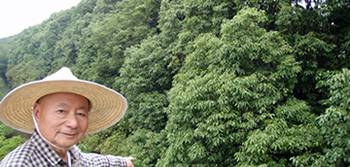
Akira Miyawaki is a Japanese botanist born in 1928, world specialist, expert in plant biology, professor at Yokohama National University and specialist in seeds and the study of forest naturalness. A pioneer in Asia in retrospective ecology applied to forest restoration, he developed and put into practice the “senzai shizen shokysei” reforestation method, or “ natural potential vegetation”. This method tends to restore natural vegetation on degraded, industrial and urban soils.
Experiments carried out, among others, in Japan, have shown that it is quite possible to restore soil degraded, formerly covered with concrete.Micro-forests have been planted in town centers. This made it possible to promote the infiltration of runoff water , to avoid flooding , to recharge groundwater more effectively and to prevent soil erosion !
In 2006, Prof. Miyawaki's work was awarded the Blue Planet Prize, which is the equivalent of the Nobel Prize for Ecology. Thanks to his method, more than 40 million trees have been planted around the world. Which represents approximately more than 3000 native forests.
According to Prof. Miyawaki, it is possible to quickly grow resilient forests on degraded soils provided you respect a few major principles:
- Select different varieties of plants native to a region,
- Germinate seeds in nurseries,
- Prepare the soils by fertilizing them with natural materials (compost, decaying plants, bark, earthworms, ants, etc.), they must be sufficiently rich and loose to accommodate young roots,
- Replant the plants one or two years later, respecting the motto of 3 different species / m²,
The use of this method has shown real efficiency in the creation of new forests.
The concentration of around thirty different species, which must range from the bocage shrub to the trees in the canopy, makes it possible to optimize the vertical space. This method allows you to get as close as possible to what a forest naturally does to develop. Which is essential for its survival.
It also allows the creation of forests at a much faster and more efficient rate thanks to the synergies and interactions that plants exert on each other. This is not the case during classic reforestation of trees well spaced from each other.
Thus, planting 3 different trees per m² helps promote root communication, limit weeds and promote exposure and access to light. This proximity of rooting makes the trees more resistant to climatic hazards as well as to diseases. A stable and resilient ecosystem is taking shape.
In addition, we can note that very quickly, these forests are 30 times denser, have a growth 10 times faster and a development 20 times richer in biodiversity than a conventional plantation.
This method does not require much maintenance of the recreated spaces. After 3 years, the forest is completely autonomous.
The density of planting makes it possible to recreate native micro-forests on surfaces of around 100 m². This area is sufficient to restore a small, rich and resilient forest ecosystem.
Like JADAV PAYENG who was able to rebuild a forest all by himself on the island of Majuli in India, reforestation was carried out according to this principle in Asia (Japan, China, Malaysia, Thailand, Cambodia), in America South (Brazil), India, Africa (Kenya) and Europe.
Because the forest is our best ally in the fight against climate change, we are seeing the emergence, in several countries around the world, of citizens' associations to create projects for the creation of micro-forests in nearby towns and countryside. .
These little green lungs scattered around the heart of our cities act as temperature regulators and can reduce the surrounding temperature by several degrees through the phenomenon of evapotranspiration from the leaves.
As we all know, nature is full of surprises as long as we know how to make the most of what it gives us. Introduced into our urban environments, micro-forests could act quickly and effectively on air quality . They can significantly reduce fine particles , by around 50%.
Without waiting for sorcerer's apprentices in geoengineering to come and do their experiments, at the risk of further degrading our environment, these micro-forests also play the role of carbon storage powerhouse. CO2 that they absorb while returning a large amount of oxygen in return in the atmosphere, thanks to the fabulous phenomenon of photosynthesis.
What could be better than to be inspired by these natural initiatives to give back to our cities green spaces. Spaces that recreate what we keep destroying. Together, let's rebuild what nature does best. Another example to follow!
Posted on 2021-04-02 10:10








Comments